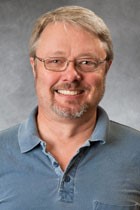 Mats Selen
Mats Selen
Department of Physics
University of Illinois at Urbana-Champaign
mats@illinois.edu
We have designed and built an inexpensive wireless data acquisition device that can be used to record and analyze high-quality ECG data. The purpose of the device, called IOLab, is to enable students to perform precision experiments outside the classroom. With the addition of a simple plug-in module, the IOLab system can acquire multi-lead ECG data with high bandwidth and low noise.
In this presentation, we describe the IOLab-ECG system and present data from clinical studies done at the University of Illinois in a collaboration among the departments of Physics, Medicine, and Intercollegiate Athletics. We have investigated two distinct configurations of the system: One that allows us to derive the standard leads (I, II, III, aVL, aVR, aVF, V1, V3, V6), and a new configuration we call orthogonal differential ECG, in which we monitor the cardiac signal along three perpendicular axes.
This work is being done in collaboration with Dr. Abraham Kocheril of the University of Illinois Medical School and Christie Clinic.
Mats Selen earned a B.S. in physics from the University of Guelph (1982), an M.Sc. in physics from Guelph (1983), and an M.A. in physics from Princeton University (1985). He received his Ph.D. in physics from Princeton in 1989. He was a research associate at the Cornell Electron Storage Ring (CESR) at Cornell University from 1989 to 1993. In 1993, Selen joined the faculty of the University of Illinois, where he has been ever since. After 25 years of studying elementary particles, he shifted his full-time research focus to understanding and improving the way students learn physics. With his Illinois colleagues, he developed the iclicker classroom response system, the smartPhysics learning framework, and, most recently, IOLab. He is a fellow of the American Physical Society and a Cottrell Scholar, and has earned numerous other honors for his research and teaching, including the 2013 APS Excellence in Education Award, which he shares with his colleagues Tim Stelzer and Gary Gladding.